Corsetry has a long and intricate history in fashion which spanned several centuries, but embraced vintage elegance of the female form. To corset vintage fashion I will delving into the evolution of corsetry, which was the form of restrictive undergarment during antique and vintage times.
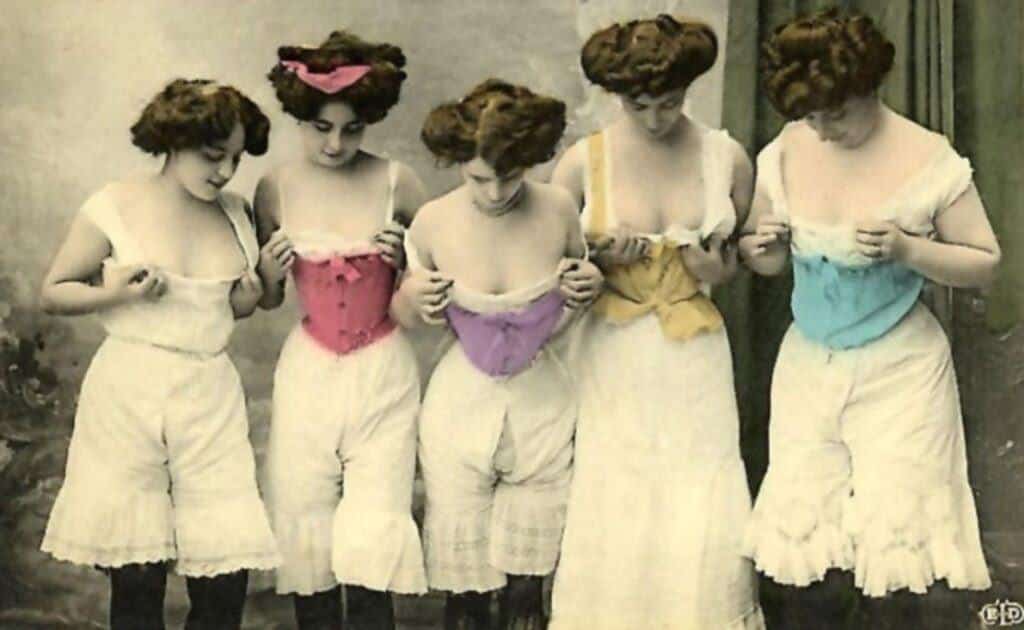
Understanding the History of Corsetry in Fashion
The earliest origins of garments used to shape the body, can be traced back to ancient civilization times such as Minoan Crete. Women in Ancient Greece and Rome wore garments to accentuate the waist creating a desired body shape. From the late Middle Ages the predecessor to the modern corset began to already emerge. In the 16th Century a stiffened bodice made of fabric or leather was created to shape and support the torso. These garments were called Stays that served a function for all women. However during the Renaissance period corsetry became more structured and evolved into a garment with a Busk which was inserted into a channel in the center front creating a straight posture. This was all still primarily a foundation garment.

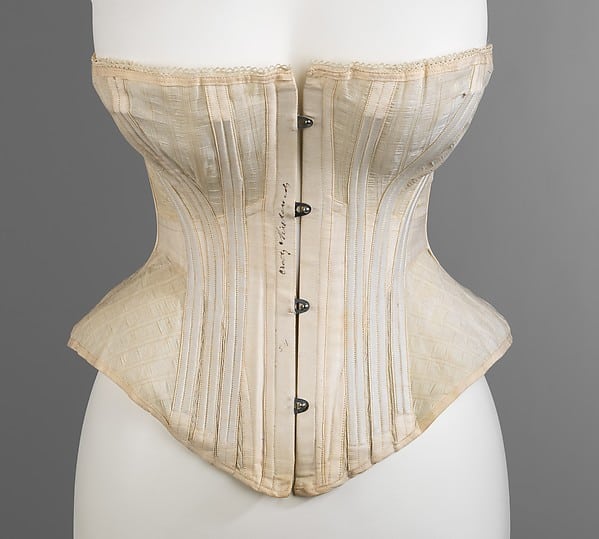
From 17th to 18th Centuries corsets became more elaborate, as the focus was on achieving a conical shape. Whalebone or reeds (large aquatic grasses), were used to stiffen the garment with the emphasis being on a rigid, upright posture with a cinched waist, as fashion trends dictated an ideal silhouette shape. The 19th Century saw a shift in corsetry with the hourglass shape becoming popular – emphasis was on a tiny waist with a fuller bust and hips. Steel boning was also introduced which provided more support and strength to the corset. The Victorian era saw corsets reach their height of popularity considered an essential undergarment for women and were intricately designed and highly decorative made with luxurious fabrics. The ideal wasp waist shape was highly fashionable leading to extreme tight-lacing practices that could harm ones health.
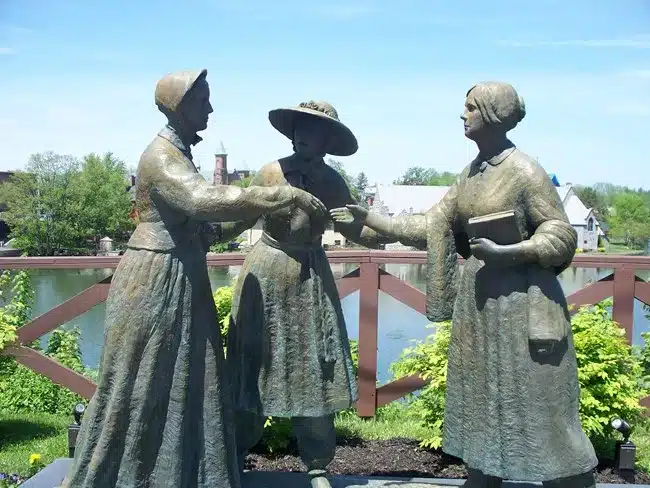
Another health issue women faced – were the heavy dresses worn from the early 19th Century – enter drawers or pantaloons which were popular from around 1830, but when an American Suffragist – Amelia Bloomer – a fashion advocate who worked to change women’s clothing styles – wore her drawers far enough below her dress, shortened for practicality – started a movement in society for women to wear bloomers. This undergarment originally became popular in late 1849 – for the purpose of developing a dress style for women, that was less harmful to their health. Because it created less restriction than their previously attire, the bloomer provided more physical freedom for women. The symbolism of bloomers was enormous. Men felt threatened by them, and sometimes disparaged women wearing them as “Amazons” or “male impersonators”. The bloomer soon became a symbol of women’s rights. I will talk more about this clothing item in another post, but in the meantime those wanting to buy some historically inspired bloomers look no further than Etsy, where you will find a myriad of styles to choose from.
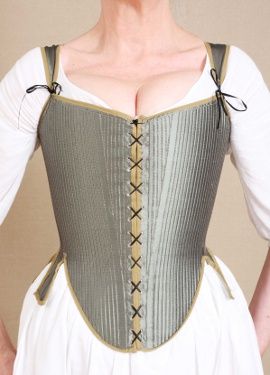
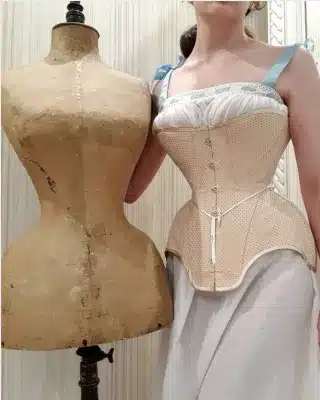
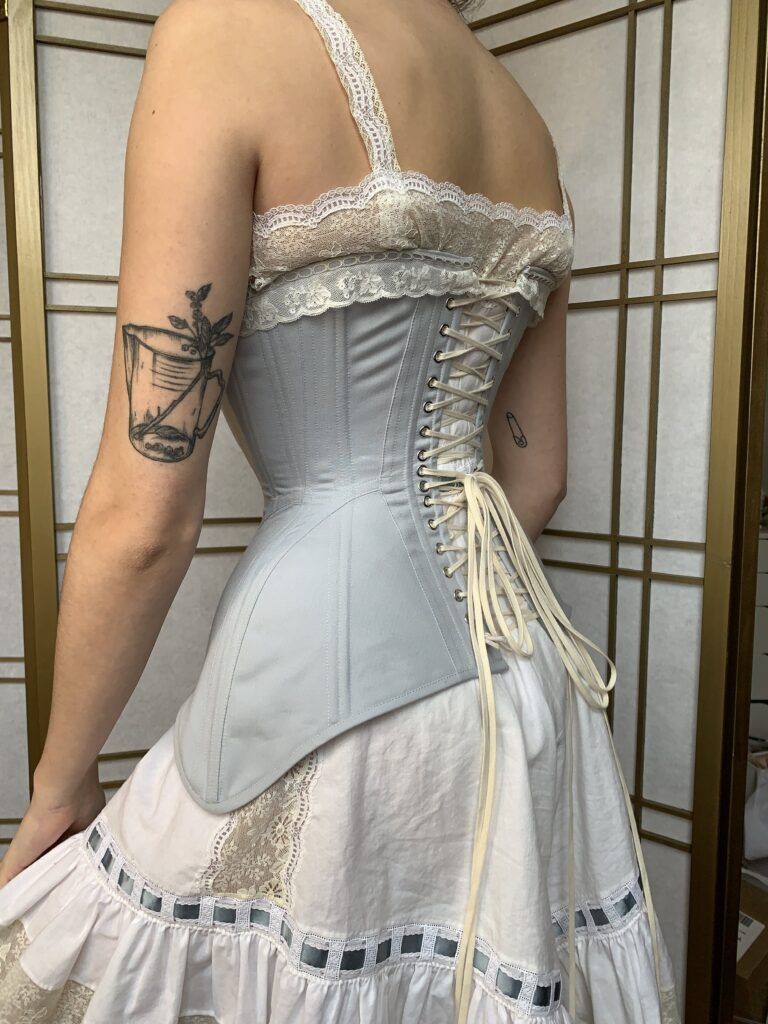
From the early 20th century, the 1900’s saw a shift from the extreme corsetry due to the rise of women’s rights movements. The “health corset” or “S-bend” aimed for a more natural silhouette whilst still retaining some shaping elements. By the mid 20th century corsets began to decline in popularity with the arrival of more relaxed, practical clothing for women, especially during wartime when resources were scarce. A new emphasis shifted towards bras and girdles as foundation garments. And by the late 20th Century corsets experienced periodical revivals in fashion, often as outerwear rather than the historical underwear it was meant for. Designers would incorporate corsetry elements into dresses, tops or even casual wear, celebrating the garment’s aesthetic and shaping qualities. The wearing of bloomers—a woman wearing pants, a men’s garment—was a question of power. The symbolism of bloomers was enormous. Men felt threatened by them, and sometimes disparaged women wearing them as “Amazons” or “male impersonators”.
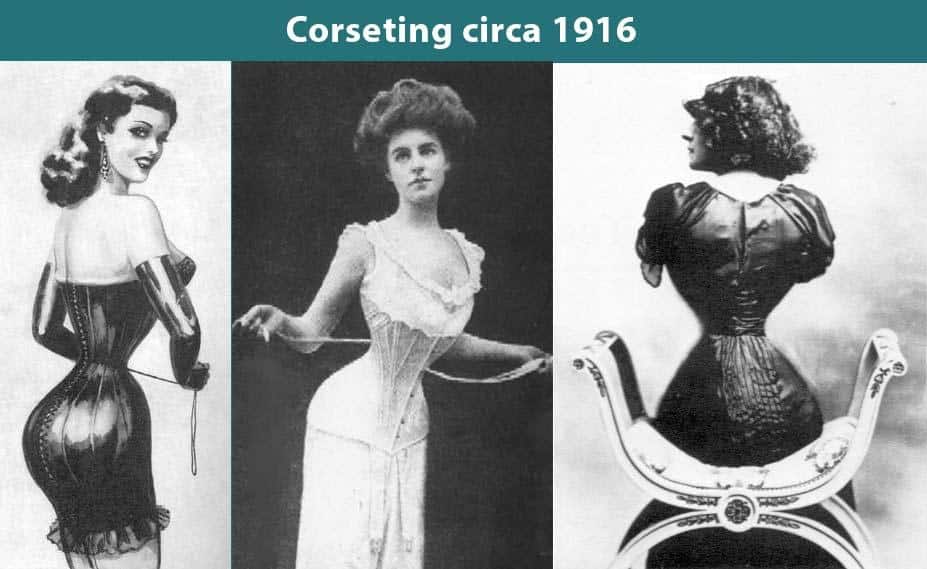
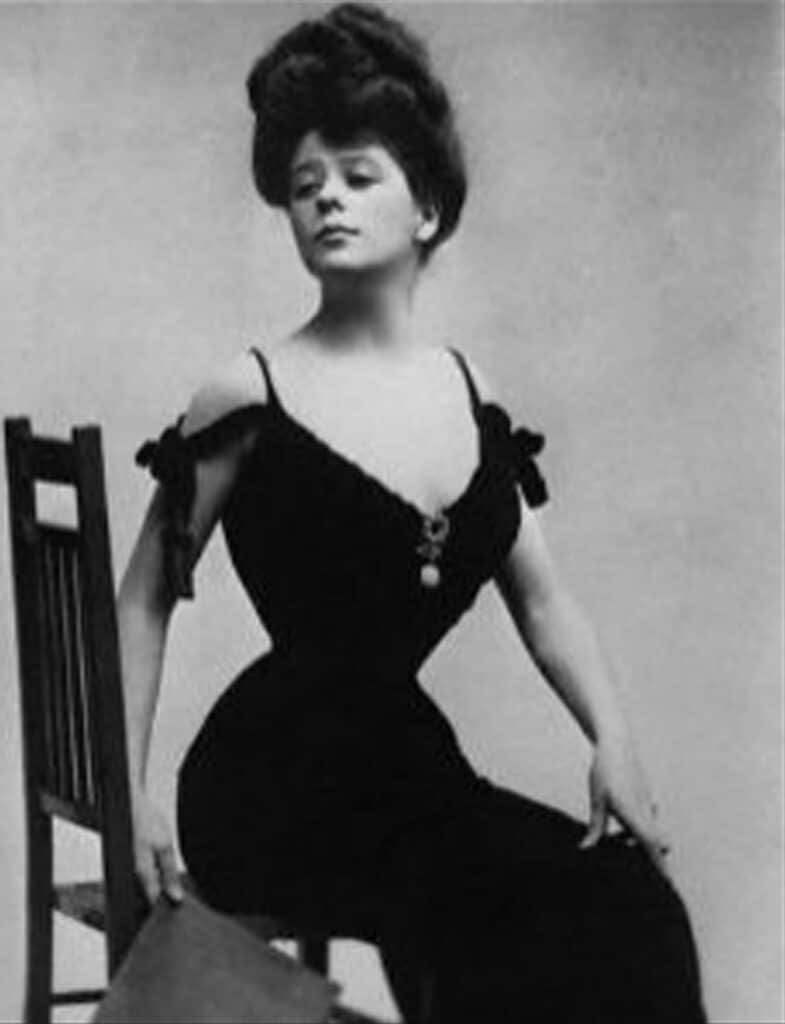
Choosing the right Corset for your Vintage Style
Selecting the right corset for your vintage style involves some understanding of the era that inspires you, the comfort, fit and authenticity all play a part for the perfect corset. You can find some historical corsets here online to purchase, or even make yourself – take a look what’s available.
Research the Era: Different periods had distinct corset styles, here are the main ones to consider.
*Victorian Era: Look for corsets with a wasp waist and intricate details.
*Edwardian Era: Consider S-bend corsets for a more natural shape.
*1920’s: Go for lighter less constricting undergarments that celebrated the flapper era.
*1950’s: Girdles or waist Cinchers were popular emphasizing a smaller waist and defined hips. Some examples of 1950’s style corsets can be bought through Etsy online.
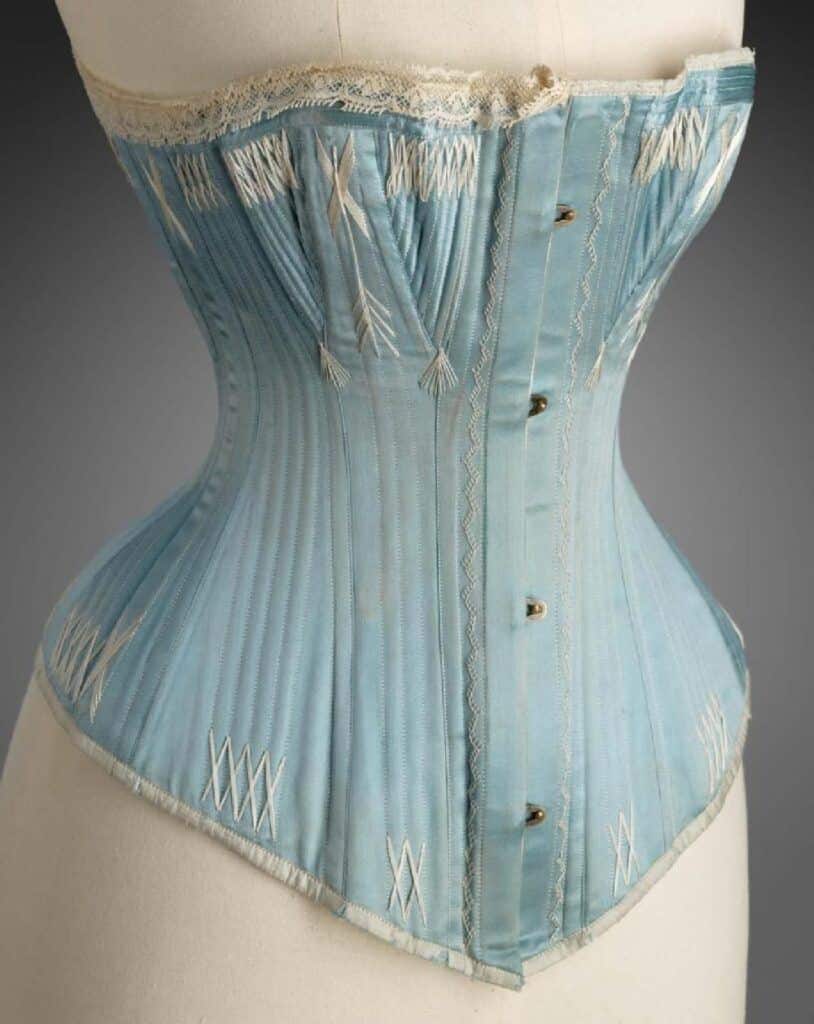
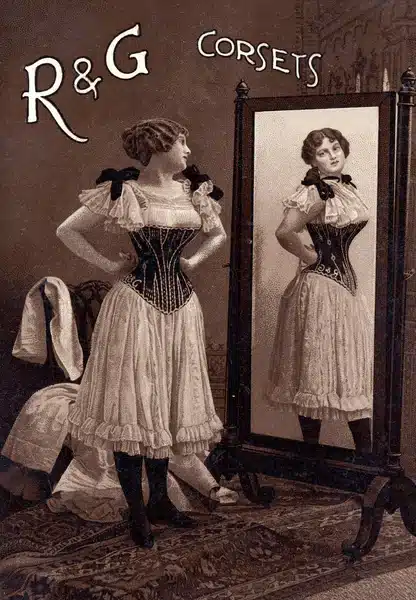
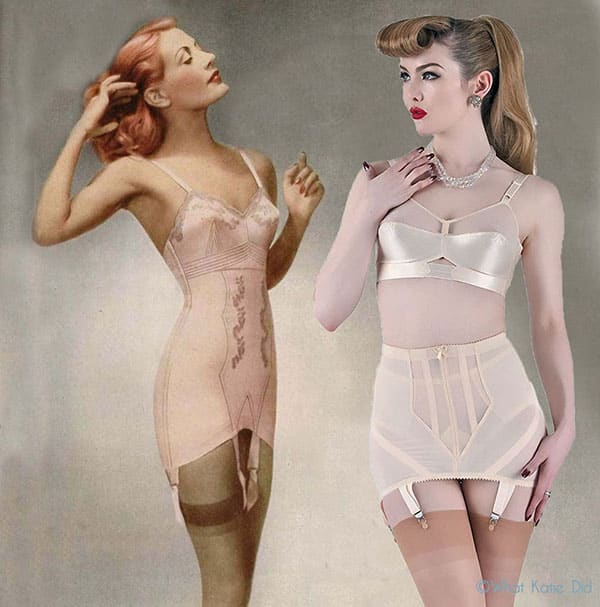
Authenticity Vs Comfort: Decide whether you like an authentic period corset or a modern adaptation? Authentic corsets may resemble historical accuracy but might sacrifice comfort? Modern versions blend historical aesthetics with modern fabrics for better comfort.
Material and Construction: Traditional corsets were made of whalebone or steel boning with tightly woven fabric, but modern corsets use materials like spiral steel boning or plastic boning for flexibility and comfort. Look for cotton or satin for comfort and brocade and silk for authenticity.
Fit and Sizing: Corsets should fit snugly and not painfully tight. Measure your waist and select a corset size based on the manufacturers measurements. If you measurements are unique then a custom made corset will ensure a perfect fit.
Purpose and Style: Determine whether you are wearing the corset as underwear, outerwear or as a costume? It will influence the style and design you choose.
Versatility: If you are seeking a corset for different outfits then opt for a neutral colour like black, white or nude that can easily blend with various styles.
Trial and Comfort: If possible, try the corset on before you purchase it. Test the fit, ease of movement and comfort. It should provide support without restricting breathing or excessive movement.
Accessories and Details: Consider some additional accessories to enhance the vintage look, such as lace trimmings, ribbons or embroidery that complement the chosen era.
Budget: Custom-made or authentic corsets can be quite costly. Set a budget and explore various options within the range, weighing up the comfort, quality and authenticity.
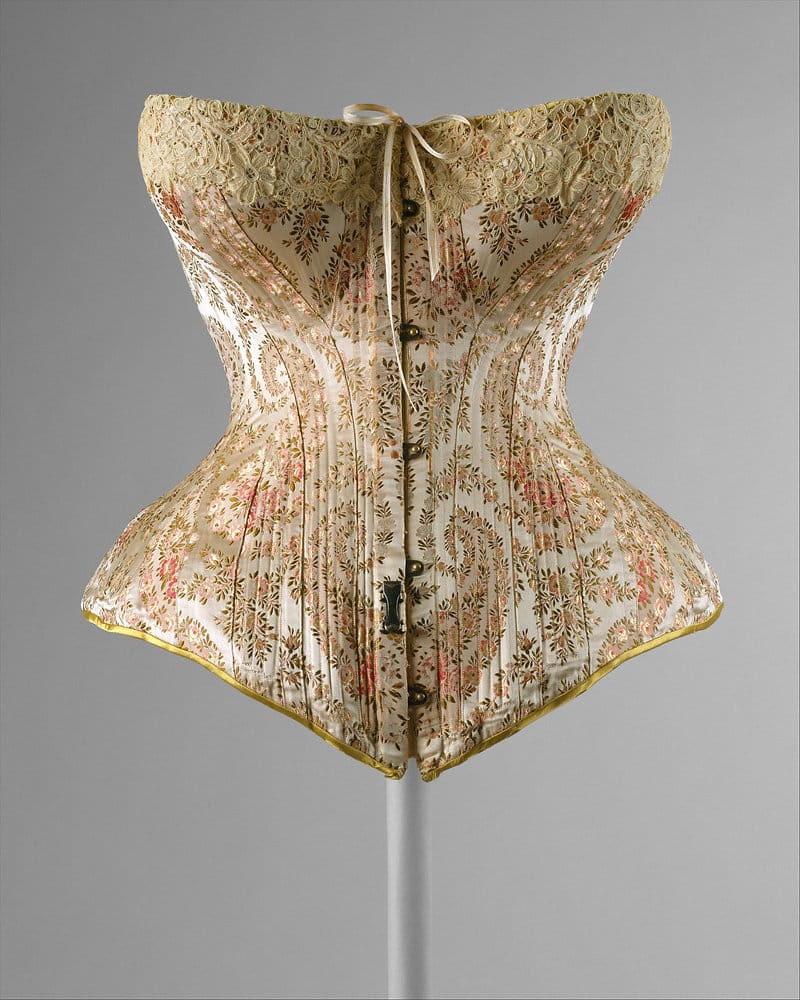
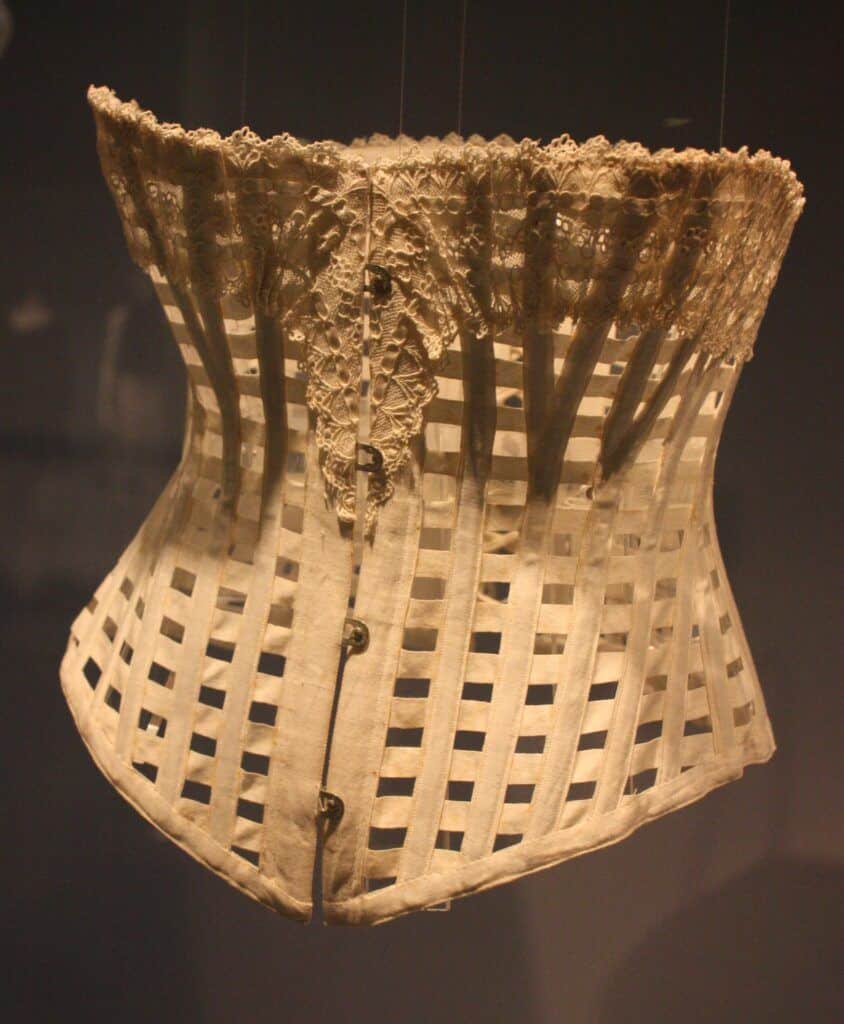
Ensuring a Perfect Fit
To measure and fit corsetry properly is crucial for comfort and to achieve the desired silhouette. Various books on different corsets are available online to purchase now.
MEASURING – Use a soft measuring tape to measure the lowest part of your waist, about an inch or two above your belly button. Make sure the tape is snug but not tight, as this is essential to determine your corset size. For overbust corsets, measure around the fullest part of your bust and then just under the bust to determine the overbust size. This will help you find the right style to accommodate your bust comfortably.
FITTING – Use your waist measurement to determine your corset size according to manufacturer’s size chart. Each brand may have slightly different sizing, so refer to specific brand’s guidelines. Decide on an overbust or underbust corset based on your style preferences and the outfit you plan to wear.
Corsets come in various silhouettes such as hourglass, wasp waist, or longline. Try on different styles and see what feels most comfortable to achieve your desired look. When trying on make sure it feels snug and not painfully tight. You should be able to breathe and move without restriction. Test it by sitting, bending and moving your arms around to ensure flexibility. If the corset has a lace up back, any small gaps are considered normal to allow for adjustments and proper tightening of the corset. But if the gap is too large or too small, it may need extra adjusting of the laces, for a better fit.
If the corset is new, it will need to be “seasoned” or what I call “breaking in”, this is gradual tightening over several wearings, much like a bra. This allows for moulding to your body shape without causing any discomfort. You may consider getting a professional fitting done by a corsetiere or seamstress, especially if it’s custom made, they will provide personalized advice to ensure a perfect fit.
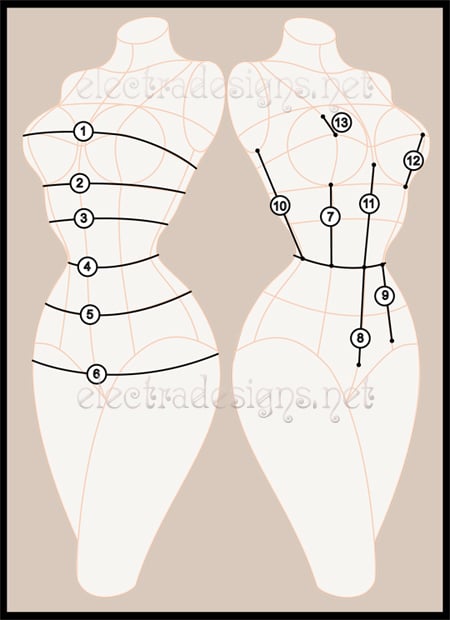
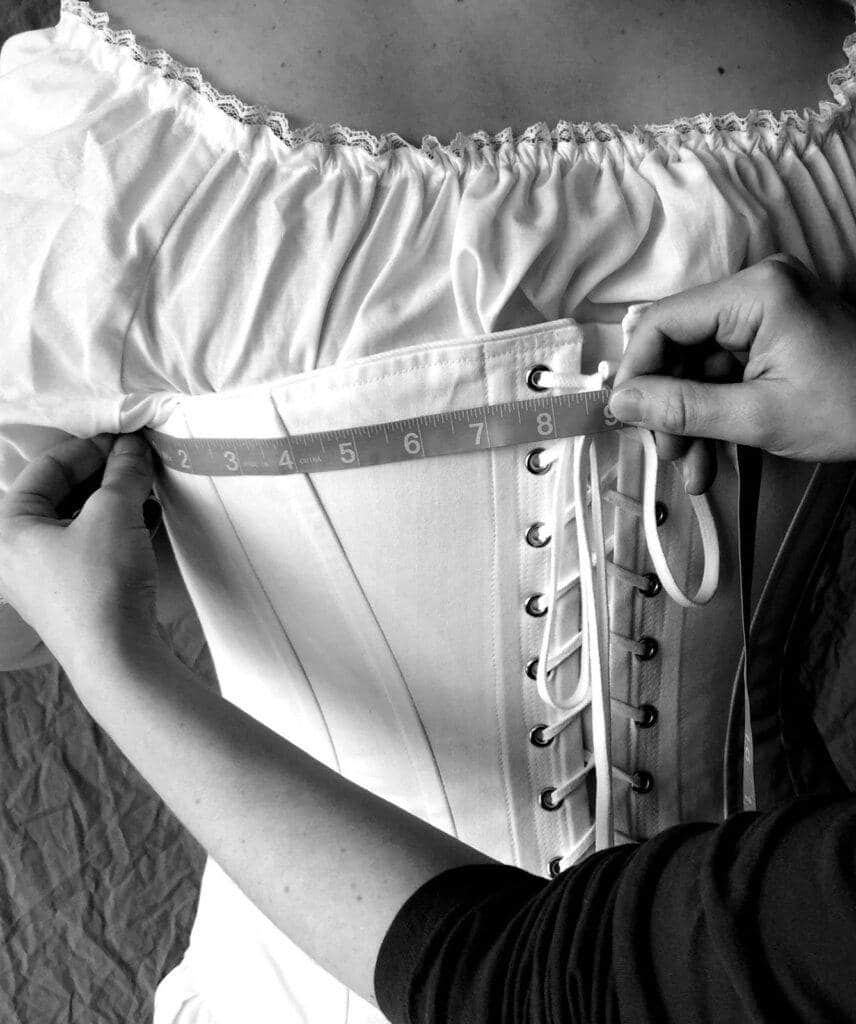
*As an Affiliate through Awin and Amazon – I may receive a commission when you click on a link and purchase through this site*
How to incorporate Corsets into Modern Wardrobes
This process can be stylish and versatile. Here are some ideas you could adapt.
As a layering piece, you can wear an overbust corset over a simple T-shirt, blouse or shirt to add a touch of sophistication to your outfit. Pair it with jeans, high waisted pants, or a skirt for a casual but chic look. Keep in mind that this look will not appeal to everyone, however if you dare to be different, and can pull it off, go for it. This also creates a statement piece as the focal point of your outfit, especially if the rest of the outfit is a pair of plain trousers or a plain skirt, it will draw attention to the corset’s design, colour or embellishments.
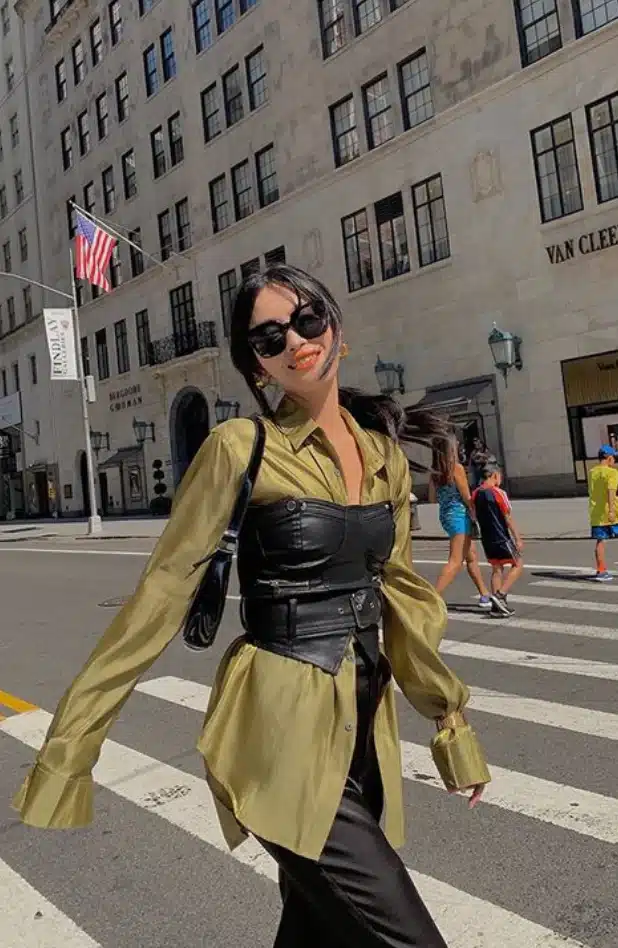
Consider wearing a corset as part of a formal ensemble. Pair it with a tailored blazer, elegant skirt, or dressy trousers for a sophisticated but stylish look. Wearing it under a fitted jacket or blazer for a strikingly structured and polished appearance, and for that unique office look that enables you to go from office to social engagement afterwards, without changing outfits. Also as an outerwear an embellished or decorative corset is very versatile when worn as a standalone top teamed with high waisted skirt or pants for a night out or special event. Modern corsets are readily available from Etsy online.
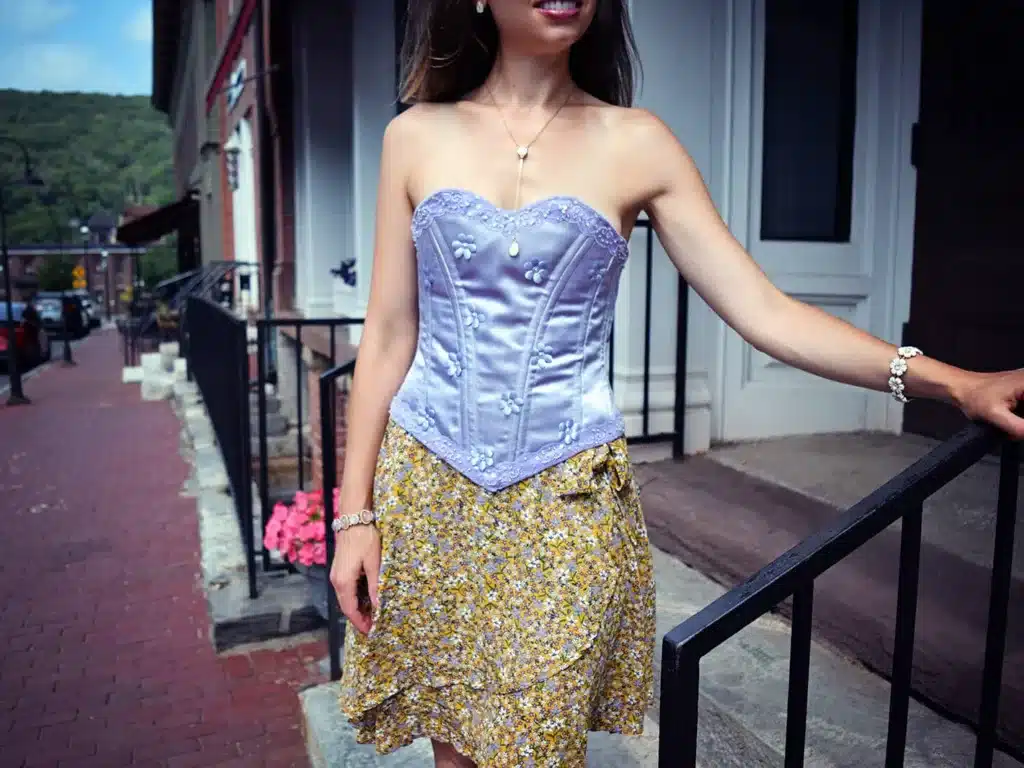
Accessorizing your outfit with a corset-style belt looks great worn over a loose dress, tunic or long shirt to cinch in the waist, adding a fashionable element to your outfit. Experiment with textures by pairing a leather or satin corset with different fabrics like denim, chiffon or wool to create an intriguing contrast. You can also balance the silhouette by pairing a structured corset with wide leg pants or a flowing skirt, creating an interesting contrast and adding visual appeal to the outfit. Modern or unconventional corset designs such as corset tops with asymmetrical cuts, lace-up details or unique patterns can give a contemporary edge to your look.
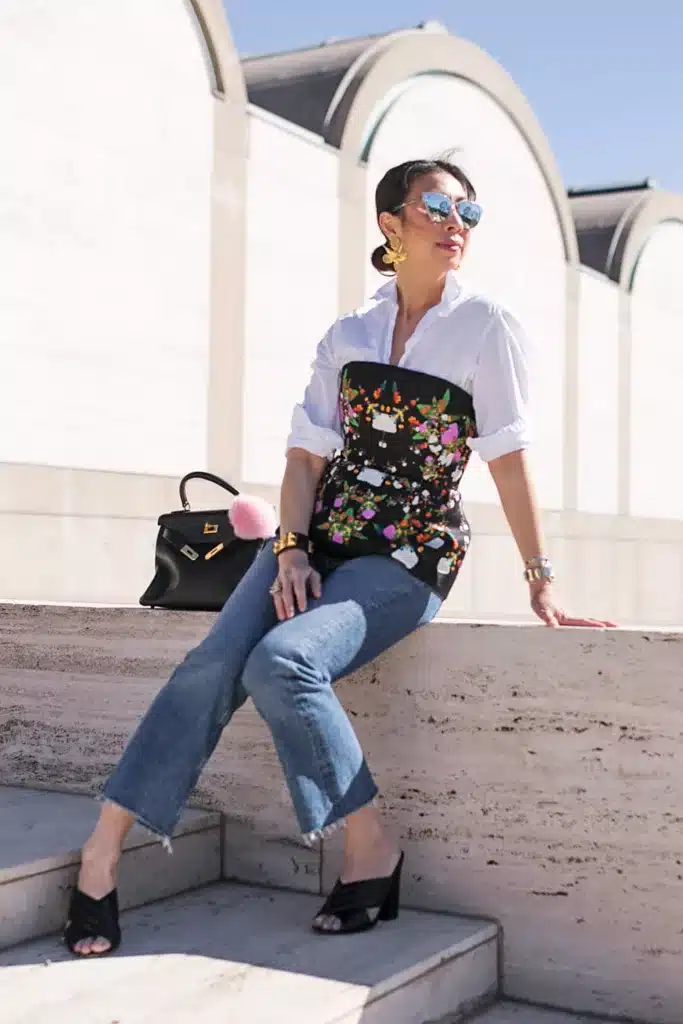
Corsets make a comeback with Steampunk Costumery
The resurgence of corsets in Steampunk costumery – which is a fascinating blend of historical revivalism and futuristic imagination. We look into the elements of it’s popularity:
Victorian Inspiration: Steampunk draws heavily from the Victorian era, an age marked by intricate fashion and societal structures. Corsets were a prominent feature of women’s fashion during this period, cinching the waist and creating an exaggerated hourglass figure. Steampunk enthusiasts often seek to recreate elements of this era, including clothing styles. A variety of steampunk attire including corsets can be bought here at Etsy. But you can also scroll through and select these styles at Amazon.
Aesthetic Appeal: Corsets offer a visually striking silhouette that aligns well with the exaggerated and stylized nature of Steampunk attire. The hourglass figure created by corsets complements the often elaborate costumes worn in the Steampunk subculture.
Functional Roleplay: In addition to their aesthetic appeal, corsets can serve a functional purpose in Steampunk roleplay. Many Steampunk enthusiasts enjoy immersing themselves in alternate historical narratives or imagining a future where Victorian-era technology persisted. Corsets can evoke a sense of authenticity and immersion in these narratives.
Customization and Innovation: Steampunk fashion encourages creativity and innovation. Corsets provide a versatile canvas for customization, allowing individuals to incorporate gears, cogs, brass embellishments, and other Steampunk motifs into their designs. This blend of traditional garment structure with futuristic elements exemplifies the Steampunk ethos of re-imagining the past through a fantastical lens.
Community Influence: Like any subculture, Steampunk fashion is shaped by its community of enthusiasts. As corsets gain popularity within the Steampunk community, they become more prevalent in fashion trends and events. Social media platforms and online forums further amplify this trend, providing a space for Steampunk fashion enthusiasts to share inspiration and showcase their creations.
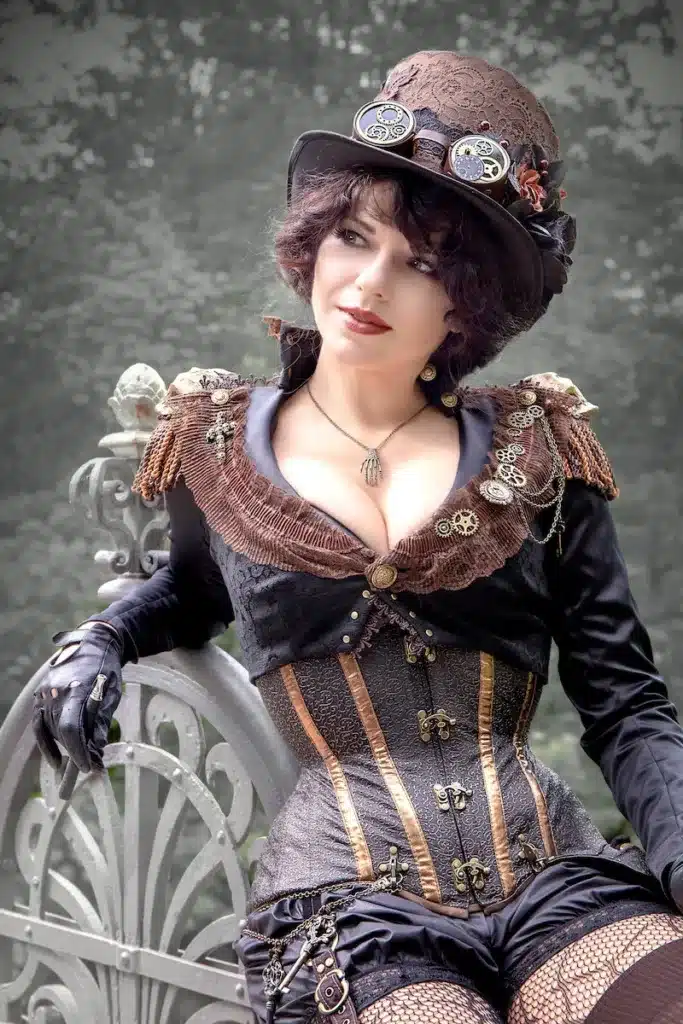
Overall, the resurgence of corsets in Steampunk fashion is a testament to the subculture’s ability to blend historical influences with imaginative storytelling and creative expression.
Practicing Safe and Comfortable Corset Wearing
Wearing a corset can be safe and comfortable if done correctly. By following these simple rules, it will ensure a safe yet comfortable wear of your corset.
Sizing is crucial, so ensure your corset fits properly and not too tight to avoid discomfort and potential health issues. Consider getting a custom made corset for the best fit if your budge allows. Gradually break in your corset through “seasoning” by wearing it for short periods of time to allow your body to adjust to the constriction slowly, and increase this gradually over several days or even weeks if possible. When lacing it up, start from the top and from the bottom, gradually working towards the middle, ensuring it’s even on both sides, but avoid pulling the laces too tightly, too quickly.

Take breaks in between wearing it, and do not wear it for long periods of time without taking a break. If you feel discomfort or difficulty in breathing, absolutely have a break from wearing it. But if you feel restricted in any way or experience some discomfort or pain, try loosening it slightly, or simply take it off. Some people wear them to improve their posture, but it’s not recommended solely for back support. However you should maintain good posture while wearing a corset to avoid strain on your back muscles. Corsets made from breathable materials such as cotton, satin or mesh can also help with comfortable wearing, but avoid those made from non breathable materials that may cause skin irritation or discomfort.
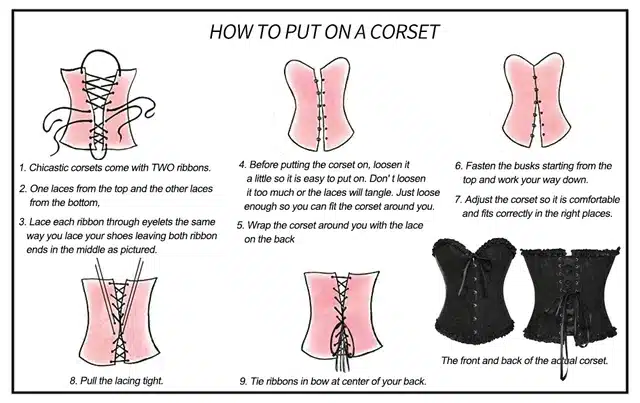
Nutrition and hydration play an important part of wearing a corset as well as comfort. So eat and drink sensibly while wearing a corset, but avoid overeating or consuming large meals all at once, which can cause discomfort. But any issues you experience with breathing or severe discomfort can mean a poorly fitted corset or improper wear, so you should remove it immediately. If you are new to corset wearing or have concerns about it, consult a professional in this field who specializes in corsetry to ensure you’re wearing it safely.
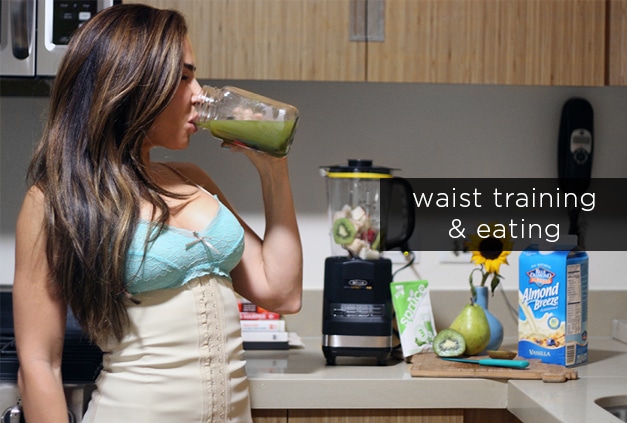
Maintenance and Care for Vintage Corsets
Taking care of vintage corsets requires a delicate approach to preserve their condition, so by observing certain care methods, we can maintain their longevity.
Storage is the number one priority. They must be stored in a cool dry place away from direct sunlight to prevent the fabric discolouring or deteriorating. Do not store in plastic bags or airtight containers which can trap moisture promoting mould. Instead use acid free tissue paper to pad and wrap the corset. Occasionally air out the corset by hanging it on a padded hanger or laying it flat on a clean dry surface, this will prevent musty odours and allows it to be properly ventilated. Incidently you can also inspect it at the same time looking for signs of wear, loose stitching or damage. Any issues should be addressed promptly to avoid further deterioration.
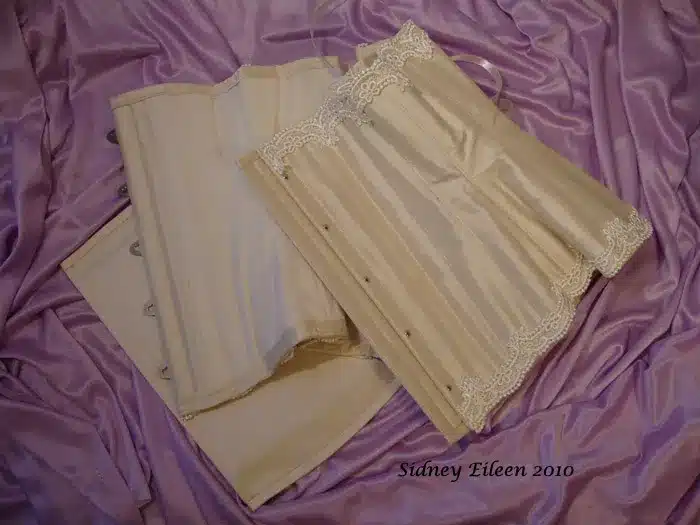
Vintage corsets may require delicate cleaning, and you can do this by spot cleaning any stains with a mild detergent and a soft sponge or cloth dabbing the affected area (but not bleach or harsh chemicals as they can damage fabric or weaken stitching), better still use natural methods – such as lemon juice, vinegar and bicarb soda which are safer to use for the age of the fabric but kinder to the environment. Consult a professional cleaner who specializes in historical garments, if they require a thorough cleaning. Never wash them in a machine or submerge in water, as this can damage the delicate fabric, weaken the boning or cause shrinkage. Check the boning regularly for signs of rust or corrosion by wiping the boning gently with a dry flannel cloth.
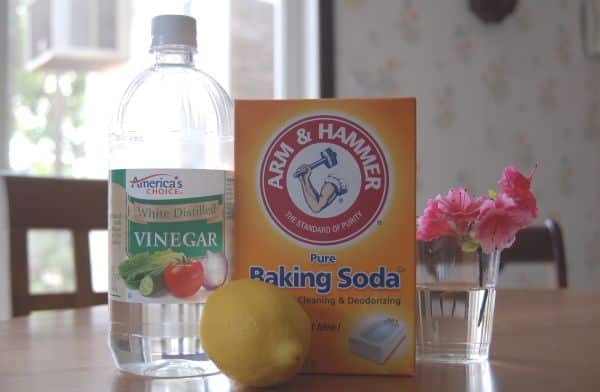
Handle the garment with gentle care and avoid pulling, bending, twisting or tugging on the fabric as this can damage the structure and stitching. Having said that, this includes frequent use, which it is not made to withstand, so reserve it for special occasions only or consider using modern replicas for regular wear. If there are any major repairs to be done, consult an expert such as a professional conservator who will advise proper restoration techniques without compromising the integrity of the garment.
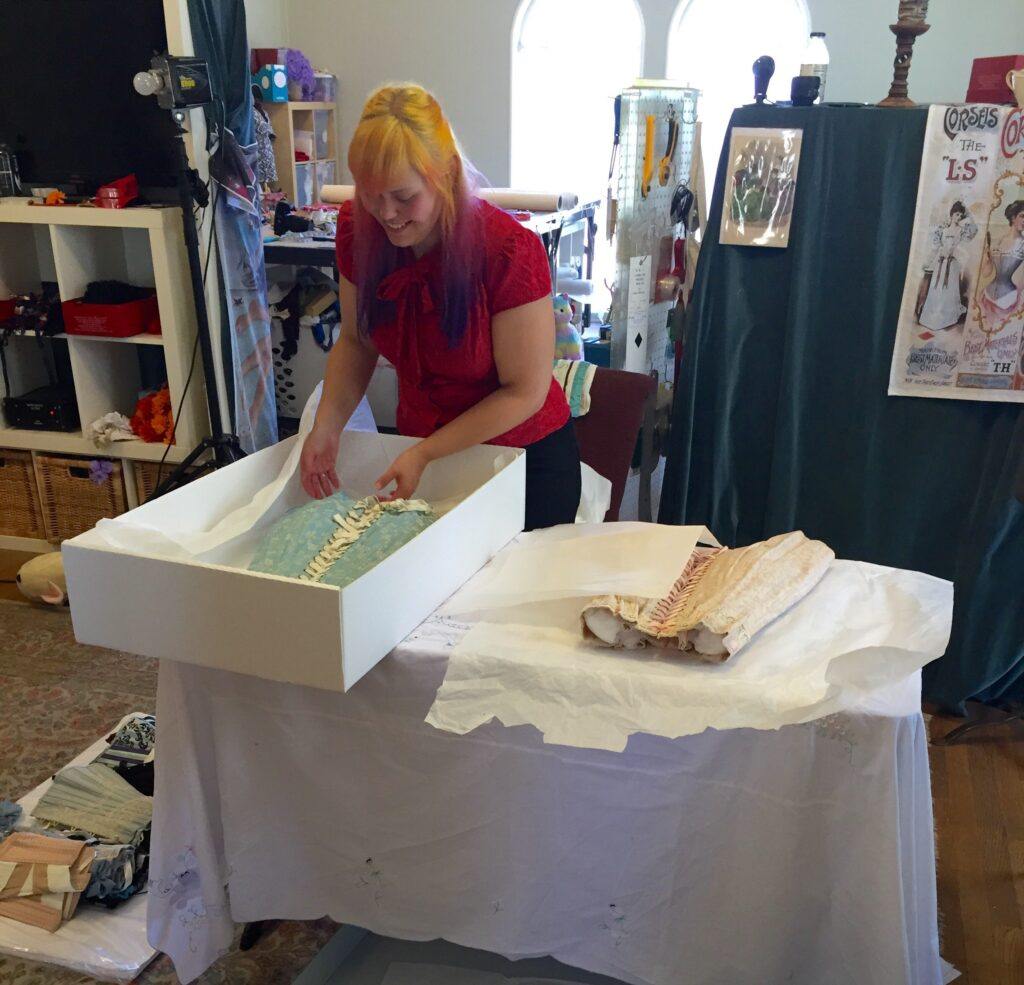
Ethical Considerations and Sustainable Practices in Corsetry
Ethical and sustainable practices in corsetry encompass various aspects from material sourcing to production and workers rights. I have listed the most important to consider.
Choose sustainable and ethically sourced materials such as organic cotton, linen or recycled fabrics for your corset construction. Avoid materials that contribute to environmental harm or involve exploitation in their production. To ensure your corset is produced under safe working conditions, fair wages and adhering to labour laws, you will have to do a bit of research into this by searching for brands that prioritize fair labour practices, are transparent about their supply chain, manufacturing processes and materials used in corset production. Brands that openly share this information demonstrate a commitment to accountability and ethical practices. However you may also consider purchasing corsets from local artisans or brands that produce their garments locally if you are not into researching a lot of information. By supporting local craftsmanship, it reduces the carbon footprint associated with transportation and supports local economies.
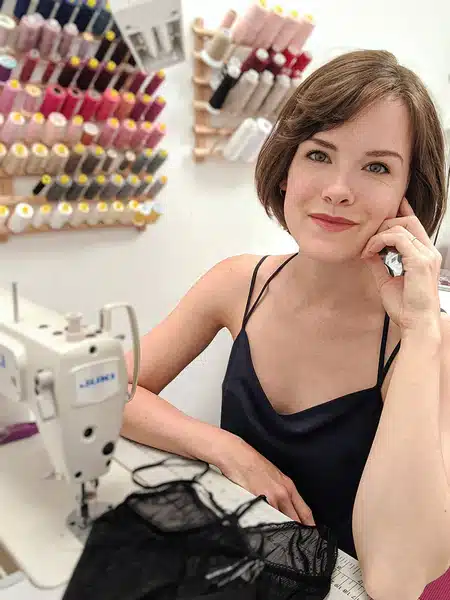
By investing in quality garments that last longer reduces the need for frequent replacements and this contributes to sustainability, so choose well-made corsets that are designed for longevity and durability if you are able to. Support brands that engage in upcycling and repurposing materials to create corsets, as this reduces waste by utilizing existing materials in innovative ways. Brands that are more sustainable will prioritize waste reduction by reusing materials and minimizing scraps in their production process thus contributing to a cleaner environment. This also includes brands that choose eco-friendly options in their manufacturing processes to minimize environmental harm.
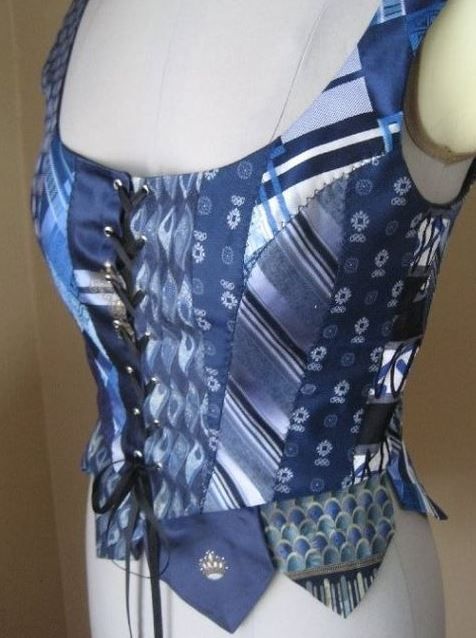
When choosing the brand for your corset production, keep in mind the ones who don’t use animal products such as leather or bone. Many modern corsets are made using synthetic materials and plastic boning, offering ethical alternatives to traditional materials. If you are passionate about ethical fashion, you can advocate for change by supporting initiatives that promote sustainability and ethical standards in the fashion industry. This will enable you to support brands that align with these practices and personally contribute to a more conscientious and responsible fashion industry whilst enjoying your choices in corsetry.
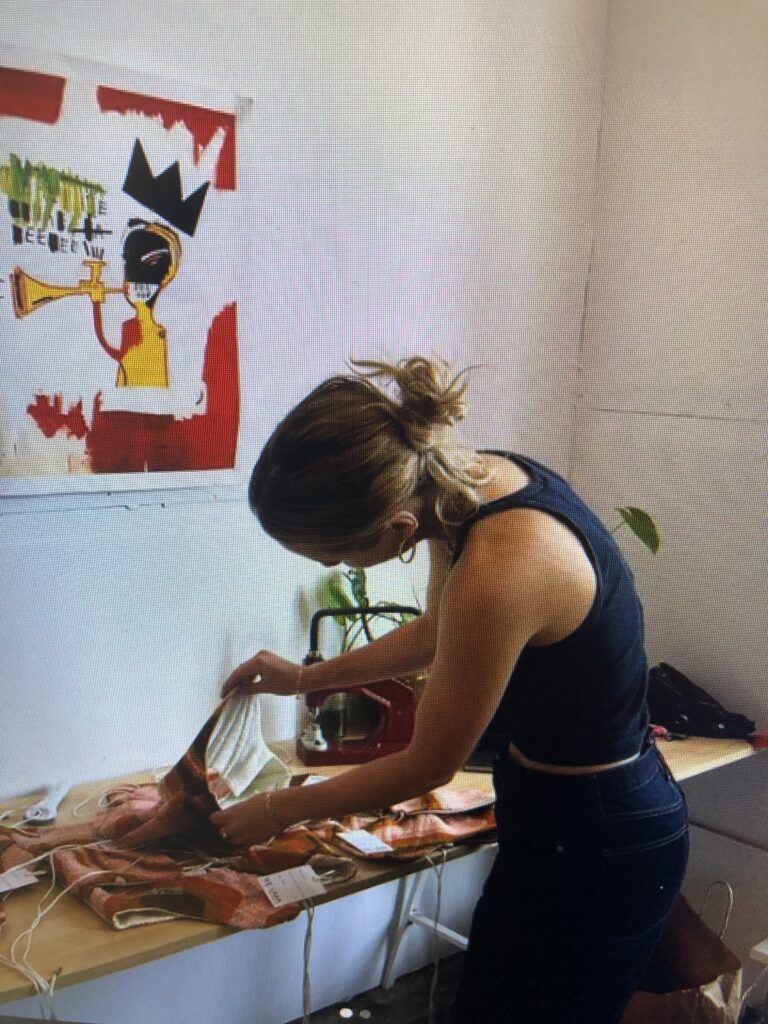
Where to find Authentic Vintage Corsets or Quality Reproductions
Finding an authentic vintage corset or quality reproduction is a bit like a treasure hunt – you never know what you will find. I always say “seek, and you shall find” this is my moto, however here are places for you to consider.
Vintage Clothing Stores: Specialized boutiques or vintage clothing stores can often carry authentic vintage corsets. Visit these local stores or check online if they have a social media page where you can ask them prior to visiting. If they can’t help you, they may know others who can. https://corsetstory.com.au/collections/vintage-clothing
Online Marketplaces: Websites like Ebay, Etsy, or Ruby Lane can be good sources for vintage corsets. If you are lucky to find something, ask the seller many questions before purchasing to ensure the authenticity of the garment. Etsy, and Amazon have a few options which are rated well, and won’t break the budget.
Antique Fairs and Markets: Source and explore antique fairs, flea markets or vintage clothing markets (in your region – example link for UK only) such events can occasionally feature vendors selling authentic vintage corsets. https://www.antiques-atlas.com/dbevents/january_2024_fairs/
Specialty or Estate Auctions: Check for these auctions online (in your region) before going in person, and ask if they sell historical clothing or costumes, as they may even include vintage corsets in their collections. https://www.antiquestradegazette.com/media/93388/atg_2600.pdf
Museum Shops or Costume Collections: Some Museums or historical sites with costume collections may sell reproductions of historical garments, or corsets in their gift shops. https://lacemade.com/collections/corset-museum
Reproduction Corset Makers: These artisans or companies that specialize in creating high-quality reproductions of historical corsets are worth a look at, if your budget allows. Search for reputable corset makers who prioritize authenticity and craftsmanship. https://redthreaded.com/
Online Forums or Groups: Engage with communities interested in historical fashion or corsetry. They can often share resources, recommendations or sometimes offer vintage items for sale or trade themselves. https://forums.vintagefashionguild.org/threads/corset-question.21190/
Costume Rental Shops: Check any costume rental shops that cater to theatrical productions or historical re enactments. They may have authentic vintage pieces for sale or rental. https://www.periodcorsets.com/rentals
Custom Costume Designers: There are costume designers who specialize in historical garments and corsetry. Creating custom pieces is their specialty and this could prove costly, however they could also have vintage inspired designs available for purchase at a reasonable price. Or you can try and create one yourself with a corset pattern right – here. https://costumecreationsbyrobin.com.au/costume-design/
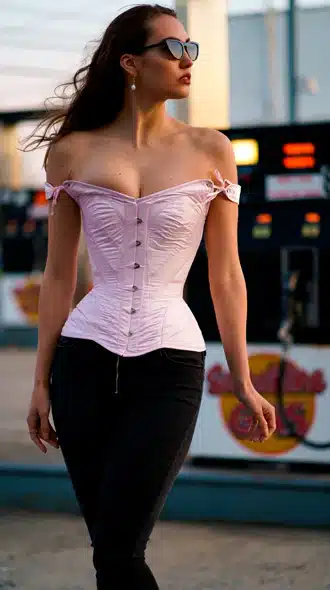
Today, corsets continue to influence fashion, though more as a symbol of historical fashion or as a choice for individual expression, rather than a restrictive garment. Modern replications focus on comfort allowing women to appreciate the style and practicality, without sacrificing comfort or health for that enjoyable vintage fashion experience.
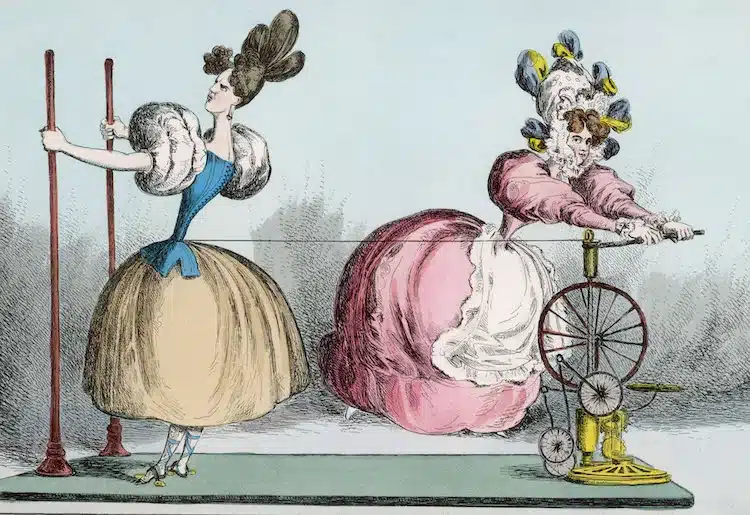
Hope you enjoyed my study on how to corset vintage fashion and why this small undergarment has made such an impact in today’s modern world. Any comments please leave them below.
Enjoy,
Regards Helen
Connect with us via our socials or get in touch below:
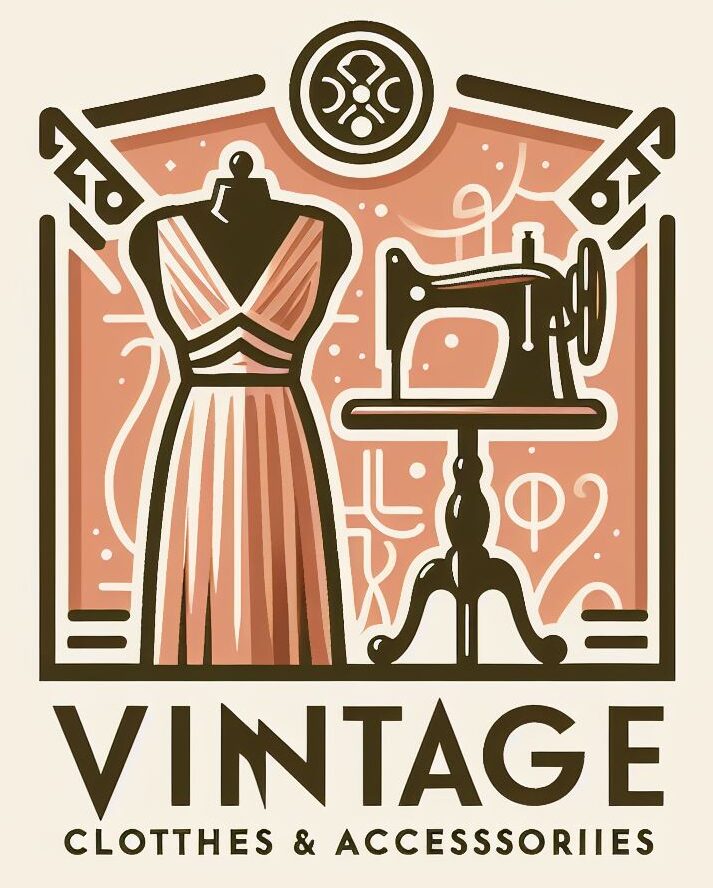
I love how corsets can shape my figure, but I am a bit careful about what they can do with my internal organs if they are pushed together too much, can you tell me a bit more about that?
Kim Kardashian has promoted corsets over the years now and they look great on her, and I think they could look great on me as lingerie haha, but not for too long.
I actually needed to wear one years ago, after back surgery,and people thought I lost weight, while I hadn’t, so they do make you look slimmer and shape your figure into an hourglass figure.
Thanks for the history, that was a fun read!
Hi Lizzy,
glad you enjoyed my post on Corsets.
If a corset is worn tightly for long periods of time – as in waist training, they can redistribute your organs such as your kidneys, liver and intestines.A much similar situation happens during pregnancy I believe? What to look out for is – make sure you can still breathe with it on, and if not – loosen it so it’s comfortable.
Some health experts say that it can cause your core muscles to become inactive, which means they can deteriorate – but this is only in extreme circumstances.
Today’s corsets – unlike those in the bygone era, are worn responsibly and there is no rule to have a waistline of 15-20″ which as you know is unrealistic.
So my advice is to choose carefully, and ask as many questions as you need to be sure you make the right choice for you.Take time and season the corset – ie, practice wearing it before the occasion and don’t have it laced up too tight. Enjoy the search and hunt for your perfect corset.
Regards Helen.
PS if all else fails and you need to pull the waist in, I have found wearing a neoprene band with velcro closure great as a waist trainer when walking, sewing it together.